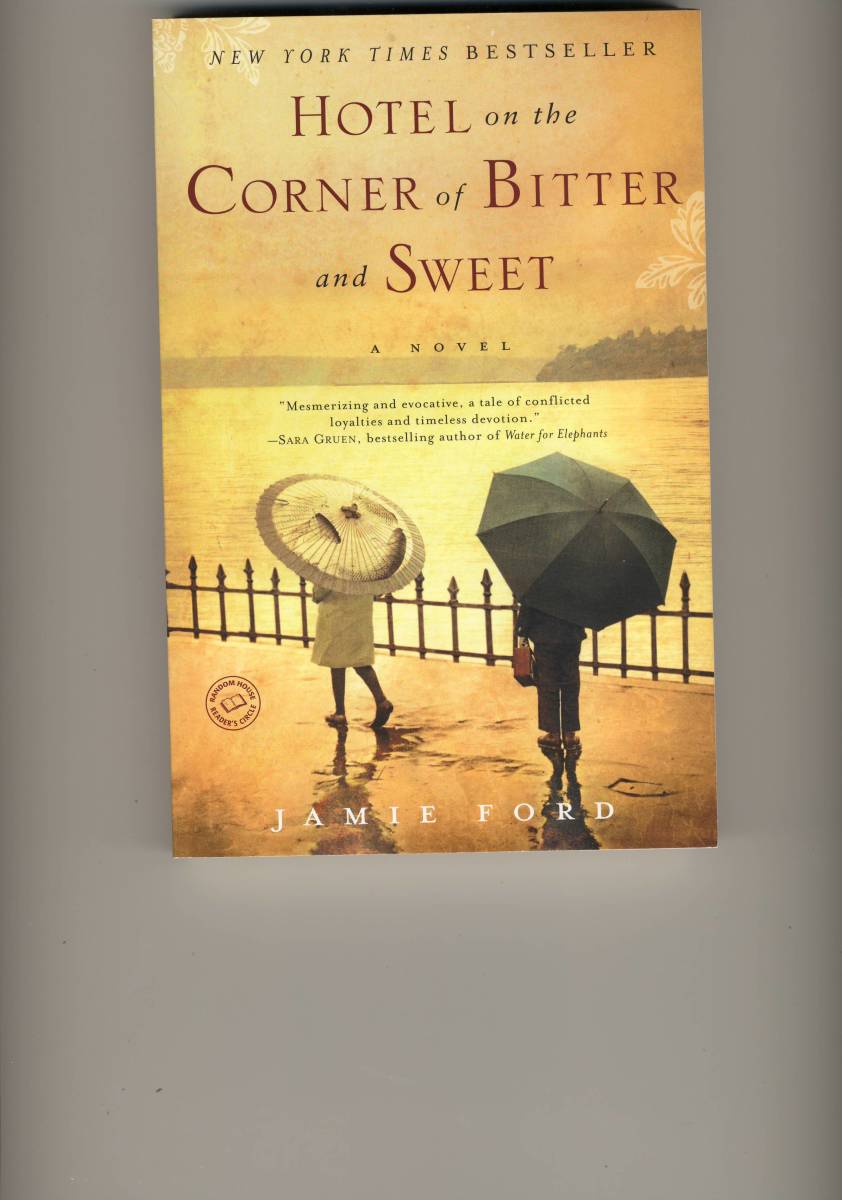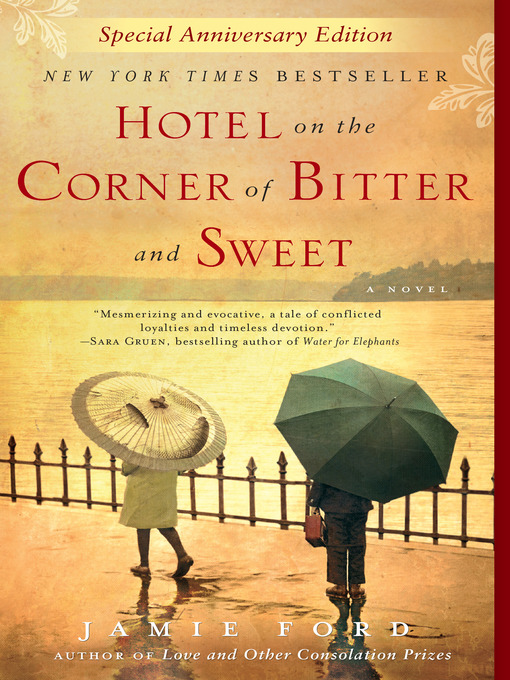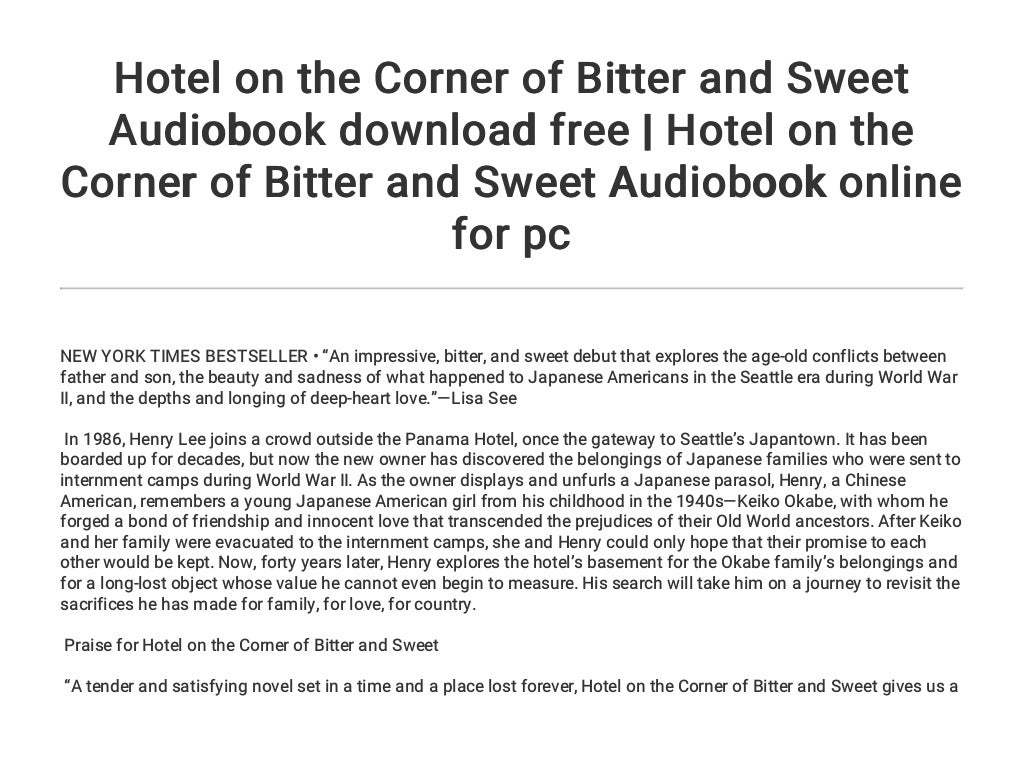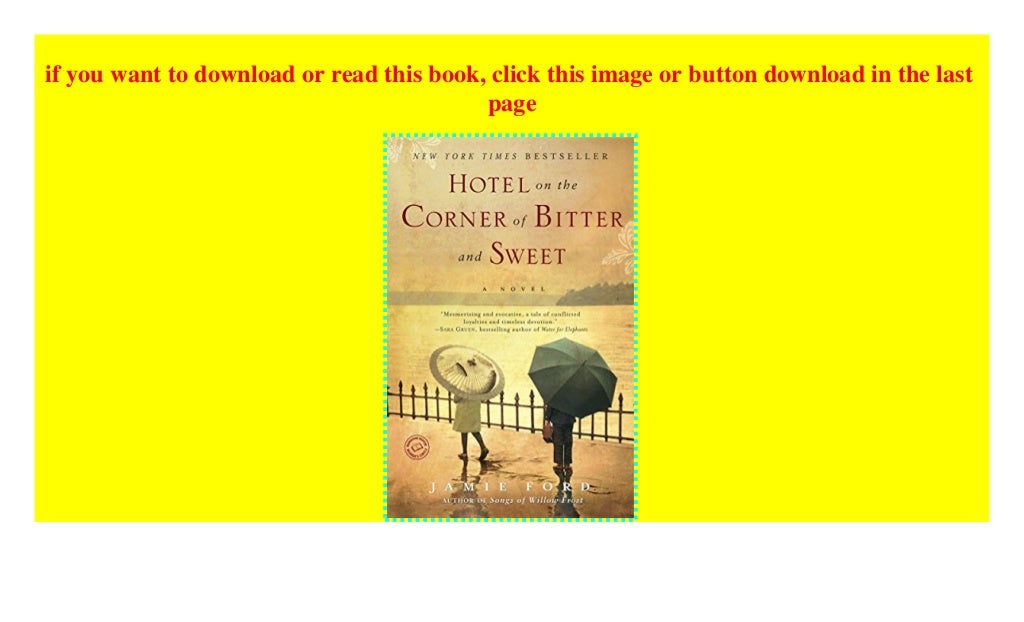
Henry & Keiko in Canton Alley Hotel on the Corner of Bitter and Sweet
The novel focuses on the town of Seattle and its cultural, musical, political, and social conflicts at the height of the Pacific War. Exploring themes of loyalty, justice, love, coming of age, music, and family, author Jamie Ford weaves a story that is not easy to forget. The novel alternates between two accounts; one told in 1986, the other.

Pin by Heidi Decor & More on Books Worth Reading Pinterest
About Hotel on the Corner of Bitter and Sweet. NEW YORK TIMES BESTSELLER • "An impressive, bitter, and sweet debut that explores the age-old conflicts between father and son, the beauty and sadness of what happened to Japanese Americans in the Seattle era during World War II, and the depths and longing of deep-heart love."—Lisa See In 1986, Henry Lee joins a crowd outside the Panama.

Hotel on the Corner of Bitter and Sweet by Jamie Ford
Hotel on the Corner of Bitter and Sweet. : In 1986, Henry Lee joins a crowd outside the Panama Hotel, once the gateway to Seattle's Japantown. It has been boarded up for decades, but now the new owner has discovered the belongings of Japanese families who were sent to internment camps during World War II. As the owner displays and unfurls a.

Dramaturgy Hotel on the Corner of Bitter and Sweet by BookIt
-345-50533-6. Hotel on the Corner of Bitter and Sweet is a historical novel by Jamie Ford. The story is told in two parallel storylines, one following 12-year-old Henry Lee's experiences during the Second World War, and the other depicting Henry 44 years later as a widower with a college-aged son. The plot centers around the forced evacuation.

Hotel on the corner of bitter and sweet book Paperback books, Books
Buy this Book UK. In the opening pages of Jamie Ford's stunning debut novel, Hotel on the Corner of Bitter and Sweet, Henry Lee comes upon a crowd gathered outside the Panama Hotel, once the gateway to Seattle's Japantown. It has been boarded up for decades, but now the new owner has made an incredible discovery: the belongings of Japanese.

Hotel on the Corner of Bitter and Sweet by Jamie Ford (2009, Trade
The Panama Hotel (1986) Old Henry Lee stood transfixed by all the commotion at the Panama Hotel. What had started as a crowd of curious onlookers eyeballing a television news crew had now swollen into a polite mob of shoppers, tourists, and a few punk-looking street kids, all wondering what the big deal was. In the middle of the crowd stood

"Hotel on the Corner of Bitter and Sweet" "In the opening … Flickr
Henry visits a nursing home in West Seattle, where Sheldon, now 74, is living. Since Ethel 's death, Henry has been visiting Sheldon every Sunday, but today he has come to give Sheldon the Oscar Holden record he found with Marty and Samantha in the Panama Hotel basement. Henry warns Sheldon that the record is broken, but Sheldon asks to hold.

Hotel on the Corner of Bitter and Sweet by Jamie Ford (English
Henry Lee. The novel's protagonist. At twelve, Henry is quiet and strong. As the only Chinese student at his all-white school growing up during World War II, Henry deals with constant bullying from students like Chaz Preston. read analysis of Henry Lee.

Book Review of New York Times Bestseller Hotel on the Corner of Bitter
The key events of this novel are defined by the balance between positive and negative, a theme that is reflected in the symbol of a corner, a cut-off point, between bitter and sweet. Henry's.

What is the theme of the hotel on the corner of bitter and sweet
"An impressive, bitter, and sweet debut that explores the age-old conflicts between father and son, the beauty and sadness of what happened to Japanese Americans in the Seattle era during World War II, and the depths and longing of deep-heart love." —Lisa See "A tender and satisfying novel set in a time and a place lost forever, Hotel on the Corner of Bitter and Sweet gives us a.

Hotel on the Corner of Bitter and Sweet by Jamie... Go Book Yourself
Historical Context of Hotel on the Corner of Bitter and Sweet. The novel takes place during the internment of Japanese Americans by order of the US federal government. Over 100,000 Americans of Japanese descent were removed from there homes and imprisoned during this time. The novel makes mention of Executive Orders 9066 and 9102.

Hotel on the Corner of Bitter and Sweet Cuyahoga County Public
Hotel on the Corner of Bitter and Sweet Summary. Through intertwined timelines—one in the 1940s and one in the 1980s— Hotel on the Corner of Bitter and Sweet tells the love story of a Chinese American boy, Henry Lee, and a Japanese American girl, Keiko Okabe. Henry and Keiko meet in Seattle during World War II; they both attend an all-white.

Hotel on the Corner of Bitter Sweet Crossword WordMint
These papers were written primarily by students and provide critical analysis of Hotel on the Corner of Bitter and Sweet by Jamie Ford. Japanese Internment and The Hotel on the Corner of Bitter and Sweet. Don't Do the Unthinkable, Just Do What's Right: Henry's Morality in Ford's Novel. Conscious Conscience.

Hotel on the Corner of Bitter and Sweet Audiobook download free Hot…
Hotel on the corner of bitter and sweet by Jamie Ford. Publication date 2009 Topics Fathers and sons -- Fiction, Japanese Americans -- Evacuation and relocation, 1942-1945 -- Fiction, Widowers -- Fiction, Seattle (Wash.) -- Fiction Publisher Ballantine Books Collection

Make N' Take Hotel on the Corner of Bitter and Sweet
Henry is horrified by his father's callousness, so he lies to Mr. Preston. "My father won't approve of the sale," he says. "It was once a Japanese cemetery and it's very bad luck to build there. That's why the lot is empty.". Here, Henry makes his choice. In lying outright to his father, Henry takes his first act of rebellion.

Hotel on the Corner of Bitter and Sweet [download]_p.d.f))^
Hotel on the corner of bitter and sweet : a novel by Ford, Jamie. Publication date 2009 Topics Evacuation and relocation of Japanese Americans (United States : 1942-1945), Fathers and sons -- Fiction, Japanese Americans -- Evacuation and relocation, 1942-1945 -- Fiction, Widowers -- Fiction, Prejudices -- Fiction, Concentration camps -- Fiction.